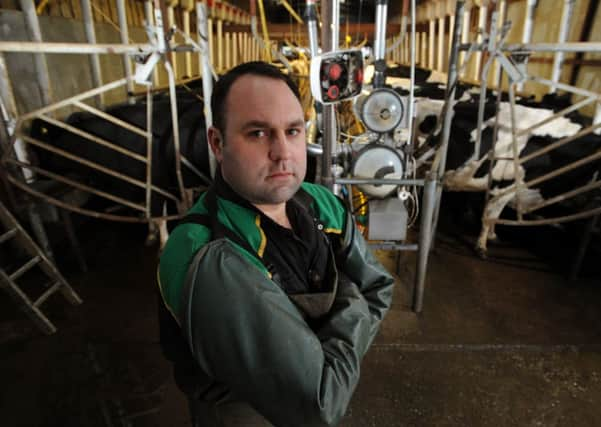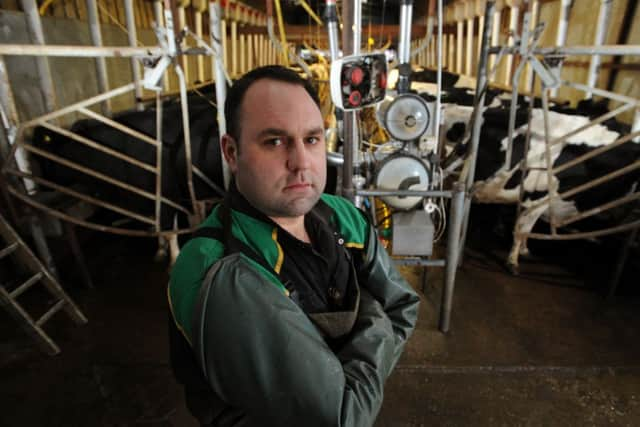Video: Missed payments puts dairy farms in ‘dire’ state


First Milk, a co-operative owned by British farmers, said 2014 was a “year of volatility that has never been seen before” in the global dairy industry.
Its chairman, Conservative MP Sir Jim Paice, said it was delaying today’s payments to farmers by two weeks and all subsequent payments by a fortnight to build a “stronger business platform”.
Advertisement
Hide AdAdvertisement
Hide AdBut the move leaves many farmers facing financial difficulties, according to David Handley, chairman of Farmers For Action, who told delegates at Semex in Glasgow, the first major dairy conference of the year: “It’s a dire situation when farmers get told they’ve got a delay of two weeks in receiving their milk cheque. It’s a pretty serious situation because within that two-week period you’ve got to go and be able to tell your bank manager, your creditors, that there is a delay.


“Some people may be lucky enough to be financially sound enough that their bank supports that. There are many that are stretched already. Their bank manager may see this as a death knell and say sorry, we cannot support the business for another fortnight.”
Creditors too may be owed considerable amounts of money who are in the same position, he said, and waiting for a fortnight could put them in a difficult position.
Mr Handley questioned the legality of the sudden move by First Milk but admitted farmers had to be supportive as well as critical of the company because if it went into receivership, another 800 million litres of milk would enter an already flooded market, reducing prices even further.
Advertisement
Hide AdAdvertisement
Hide AdMeurig Raymond, president of the National Farmers’ Union and another speaker at Semex, said First Milk’s decision came when dairy farmers were already under huge financial pressure.
“What we want is an economically sustainable dairy industry for the future,” he said. “As farmers face volatile markets, I’m also convinced that the Government can do more to help by ensuring its policies are sympathetic to the current situation and will help farmers and farming businesses continue forwards.”
In a statement for First Milk, Sir Jim said the company was explaining to the major banks why it had taken its decision so that banks were well equipped for conversations with its members, adding: “We don’t know how long this current market downturn will last, and we are aware that hundreds of UK dairy farmers are unlikely to find a home for their milk this spring.
“Our priority is to make the business and our processing assets as secure as possible in order that we can continue to process and market every litre of our members’ milk.”
Farmer’s year-long battle just to break even
Advertisement
Hide AdAdvertisement
Hide AdFor dairy farmer Tom Rawson and his family the year ahead promises to be a challenging one.
His early calculations have left him and his wife Catherine, who are in business with Tom’s parents as tenant farmers in Dewsbury, expecting to break even at the very most in 2015.
The 300-strong herd of cross-bred cattle at Thornhill Hall Farm produce milk that the family provides to Arla at a price that has fallen again this month, to 24.81 pence per litre (ppl).
Second generation farmer Mr Rawson, 36, said: “We have seen a reduction of 10 ppl over six months. When you are producing 1.5m litres a year, it makes a big difference. It’s come off a good high (with average prices having peaked at more than 34 ppl in November 2013) but the reality is that the high didn’t last for very long.
Advertisement
Hide AdAdvertisement
Hide Ad“I’ve just done our budgets for this year and with the system we operate - spring calving at the lower end of the cost scale - we will be drawing even so those who are producing all year round will really struggle and many will be faced with stark choice about whether they continue.
“For us, it puts us in a position where the relationship with bank manager is important and we’re always cutting costs to the bare minimum.”
Mr Rawson said the silent victims of falling prices included feed businesses who supply dairy farmers but might face a wait to be paid by as their customers struggle to make ends meet.